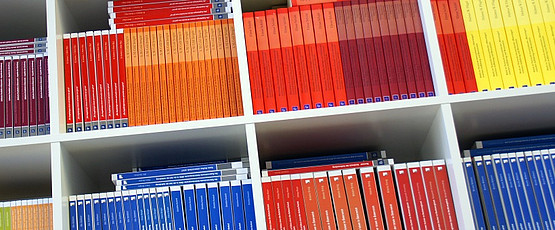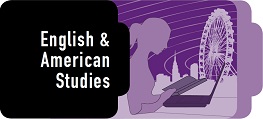End of this page section.
Go to overview of page sections.
Begin of page section: Additional information:
Helpful
End of this page section.
Go to overview of page sections.
Modules
Begin of page section: Contents:

The course content has been developed around three main topics: linguistics, literary studies and cultural studies.
The programme of study is designed to prepare students for a wide range of employment opportunities upon completion of the degree. Notwithstanding varying qualification profiles, many professional fields require a sophisticated understanding of and competence in languages as well as highly developed cultural and academic competences.
Literary Studies
The coursework in literary studies deals with texts from the whole of the English-speaking world. The focus is mainly on British and American literature, but other literatures in the English language will also be examined, taking regional and cultural studies of the respective countries into consideration.
Cultural Studies
This area will explore the culture, society, institutions and history of English speaking countries as these inform the development of linguistic and literary practices. Classes in cultural studies address recognition, analysis and evaluation of the target culture(s) by reflecting on one's own cultural context. Further, aspects of cultural theory and methodology will be examined. Education and training in cultural studies deals with essential cultural, social, and historical characteristics of English speaking countries. The focus is mainly on Britain and the US but does not exclude specific cultural developments in other English language countries.
English Linguistics
The coursework in linguistics has as its objective the consolidated understanding of the development and structure of the English language. Linguistics is understood as being both theory and application oriented, and, furthermore, takes aspects of cultural studies in the English-speaking world into consideration.
English Language Proficiency
An additional value of the program is its emphasis on English language proficiency. The main objective of the practical language training is to increase the student's level of competence to C2 of the Common European Framework of Reference.
Restricted Electives
Students choose additional courses from one of the core areas (literature, linguistics or cultural studies) as their specialisation.
Free Electives
Free electives are classes that complement the compulsory classes and the restricted electives. You may also use them for complementary language courses or classes specific to the Alps Adriatic Region to add to the special area aspect.
Master's Thesis
The Master's thesis is based on research related to a subject of your choice. The thesis topic must be determined in consultation with the academic advisor by the end of the second semester.
End of this page section.
Go to overview of page sections.
Begin of page section:
End of this page section.
Go to overview of page sections.





